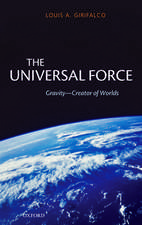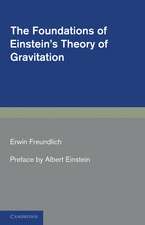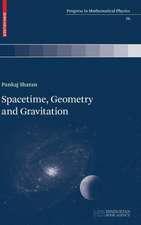Baryonic Dark Matter: Nato Science Series C:, cartea 306
Editat de D. Lynden-Bell, Gerry Gilmoreen Limba Engleză Paperback – 26 sep 2011
Din seria Nato Science Series C:
- 24%
 Preț: 797.69 lei
Preț: 797.69 lei - 18%
 Preț: 957.62 lei
Preț: 957.62 lei - 18%
 Preț: 957.13 lei
Preț: 957.13 lei - 18%
 Preț: 1227.52 lei
Preț: 1227.52 lei -
 Preț: 396.40 lei
Preț: 396.40 lei -
 Preț: 403.75 lei
Preț: 403.75 lei - 18%
 Preț: 1239.37 lei
Preț: 1239.37 lei - 18%
 Preț: 1236.51 lei
Preț: 1236.51 lei - 18%
 Preț: 1231.78 lei
Preț: 1231.78 lei - 18%
 Preț: 1229.10 lei
Preț: 1229.10 lei - 18%
 Preț: 1835.21 lei
Preț: 1835.21 lei - 24%
 Preț: 1076.39 lei
Preț: 1076.39 lei -
 Preț: 390.46 lei
Preț: 390.46 lei -
 Preț: 369.63 lei
Preț: 369.63 lei - 18%
 Preț: 1232.41 lei
Preț: 1232.41 lei -
 Preț: 394.51 lei
Preț: 394.51 lei - 18%
 Preț: 1226.24 lei
Preț: 1226.24 lei - 18%
 Preț: 1845.80 lei
Preț: 1845.80 lei -
 Preț: 399.88 lei
Preț: 399.88 lei -
 Preț: 384.28 lei
Preț: 384.28 lei -
 Preț: 390.88 lei
Preț: 390.88 lei -
 Preț: 381.19 lei
Preț: 381.19 lei - 18%
 Preț: 1848.64 lei
Preț: 1848.64 lei - 18%
 Preț: 951.14 lei
Preț: 951.14 lei - 18%
 Preț: 1230.35 lei
Preț: 1230.35 lei - 18%
 Preț: 1236.51 lei
Preț: 1236.51 lei -
 Preț: 401.03 lei
Preț: 401.03 lei -
 Preț: 406.25 lei
Preț: 406.25 lei - 18%
 Preț: 1230.84 lei
Preț: 1230.84 lei -
 Preț: 418.34 lei
Preț: 418.34 lei - 18%
 Preț: 1223.74 lei
Preț: 1223.74 lei
Preț: 389.31 lei
Nou
Puncte Express: 584
Preț estimativ în valută:
74.52€ • 80.97$ • 62.64£
74.52€ • 80.97$ • 62.64£
Carte tipărită la comandă
Livrare economică 22 aprilie-06 mai
Preluare comenzi: 021 569.72.76
Specificații
ISBN-13: 9789401067423
ISBN-10: 9401067422
Pagini: 316
Ilustrații: XII, 298 p.
Dimensiuni: 155 x 235 x 17 mm
Greutate: 0.45 kg
Ediția:Softcover reprint of the original 1st ed. 1990
Editura: SPRINGER NETHERLANDS
Colecția Springer
Seria Nato Science Series C:
Locul publicării:Dordrecht, Netherlands
ISBN-10: 9401067422
Pagini: 316
Ilustrații: XII, 298 p.
Dimensiuni: 155 x 235 x 17 mm
Greutate: 0.45 kg
Ediția:Softcover reprint of the original 1st ed. 1990
Editura: SPRINGER NETHERLANDS
Colecția Springer
Seria Nato Science Series C:
Locul publicării:Dordrecht, Netherlands
Public țintă
ResearchCuprins
How Many Baryons are There?.- Cometary Masses.- Dark Matter in the Solar System.- Low-Mass Stars and Brown Dwarfs.- White Dwarfs and the Local Mass Density.- Cooling Rates and Numbers of Faint White Dwarfs.- The Galactic Distribution of Neutron Stars.- Wide Binaries and Mass Limits on the Dark Matter.- Dark Matter in the Galactic Disk.- Systematic Properties of Rotation Curves and Dark Matter.- Are There Massive Black Holes in Galactic Nuclei?.- The Formation of Dark Matter in Cooling Flows.- QSO Absorption Lines, Early Evolution of Galactic Halos and the Metagalactic UV Flux.- Baryonic Dark Matter and the Chemical Evolution of Galaxies.- Nuclear Reactions in Inhomogeneous Cosmologies.- Constraints on Baryon-Dominated Cosmological Models from Light Element Abundances and CMB Fluctuations.- Can Halos Consist of Compact Stellar Remnants?.- List of Acronyms.














